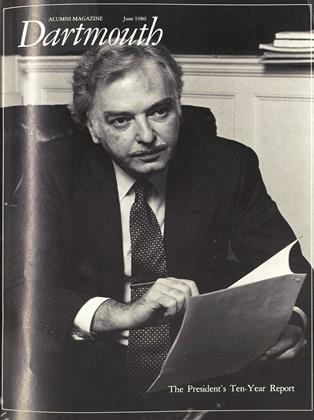The idea was to bring several distinguished public figures to the campus, seriatim, as Montgomery Fellows, and wrap them in one curricular package around a political theme in this highly political year.
Professor Laurence Radway's course "The Presidency" proved a natural vehicle. A traditional Government Department offering, it obviated the necessity of constructing a new one-time course. So Government 35 students were privy this spring to the special insights of an extraordinary group of visiting lecturers: Gerald R. Ford, 38th President of the United States; Edward Heath, former prime minister of Great Britain; Sherman Adams '2O, President Eisenhower's assistant; George Ball, former undersecretary of state; Lynda Robb, President Johnson's daughter, who now chairs President Carter's Advisory Committee for Women; and J. Russell Wiggins, long-time newspaper editor and one-time U.S. am- bassador to the United Nations. As well as lecturing in Radway's course on their special areas of competence being a President, advising a President, living with the constraints imposed on a presidential daughter, representing a President in the international arena, dealing with Presidents as a friendly chief of state, covering Presidents as a journalist the visitors delivered public addresses and met with other appropriate classes at the College.
In class, the students asked sharp and pointed questions, Radway reports; they were respectful but not awestruck. They all found Ford "curiously unassuming when he talked; ruddy, healthy, looking younger than his years; very bright." The un- dergraduates were impressed with his can- dor. Asked why he had not, in the course of pardoning Richard Nixon, emphasized a Supreme Court judgment to the effect that granting pardon imputed guilt while ac- cepting pardon confessed it, Ford replied, "I made a mistake." The students were also immensely impressed with Heath's ver- satility: While he was in town, he not only lectured on world affairs, but conducted the Dartmouth Symphony, talked with the sailing club, and was prepared to go pub- crawling after meeting with high echelons of the Dartmouth administrative establish- ment.
The visits presented some security problems, though they were not of the dimension of those posed by the 1953 Eisenhower commencement, when the Dartmouth presidential cook was allegedly dispossessed temporarily of the presiden- tial kitchen. Heath was accompanied by two Scotland Yard people, who were so in- obtrusive as to be "almost invisible." Arrangements for Ford's visit started about a month ahead, and a Secret Service advance man inspected the tentative plans. "They wanted to know where he would be every minute of the time and with whom he would be in contact," a College official reports. All plans were approved, except a meeting location in Collis Center, which was deemed too difficult to secure with its multiple windows and doors, balconies, nooks and crannies.
Ford was accompanied by 12 agents, who worked in shifts. They set up a "com- mand post" in the basement of Montgomery House where the former President stayed with the agents on duty, his personal aides, and his valet. While the Secret Service tended to Ford's safety, his own staff saw to his comfort. In deference to the presidential knee damaged by an old football injury, they asked that his itinerary around the campus be mapped to avoid stairs as far as possible. His staff also requested the availability, immediately before and closely proximate to each public appearance, of a "holding room," wherein were required Perrier water, Fresca, lemon slices, and a bowl of fresh fruit.
Handymen: Gerald Ford uses one to stress apoint, Edward Heath both to evoke a chord.
Handymen: Gerald Ford uses one to stress apoint, Edward Heath both to evoke a chord.















